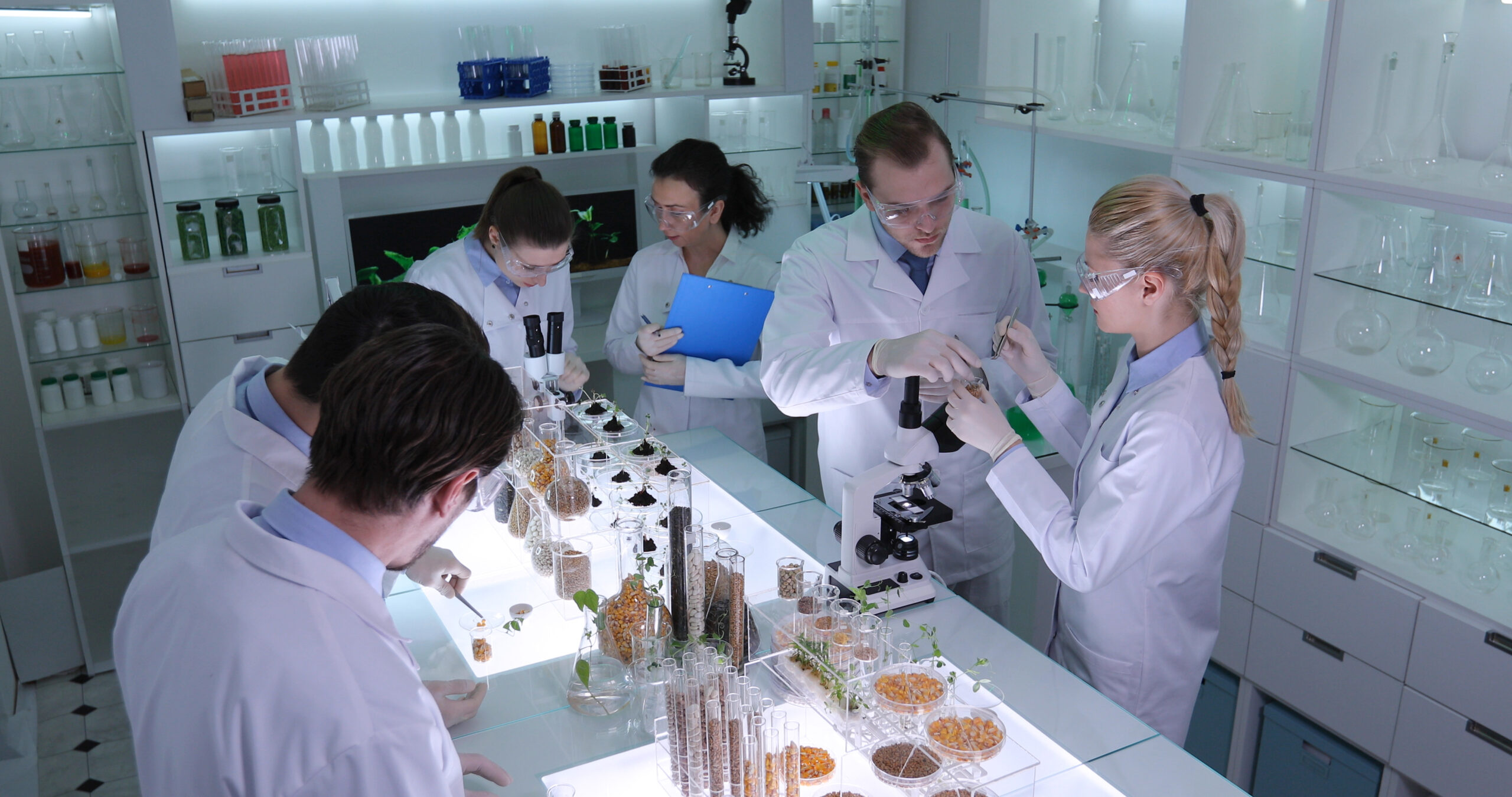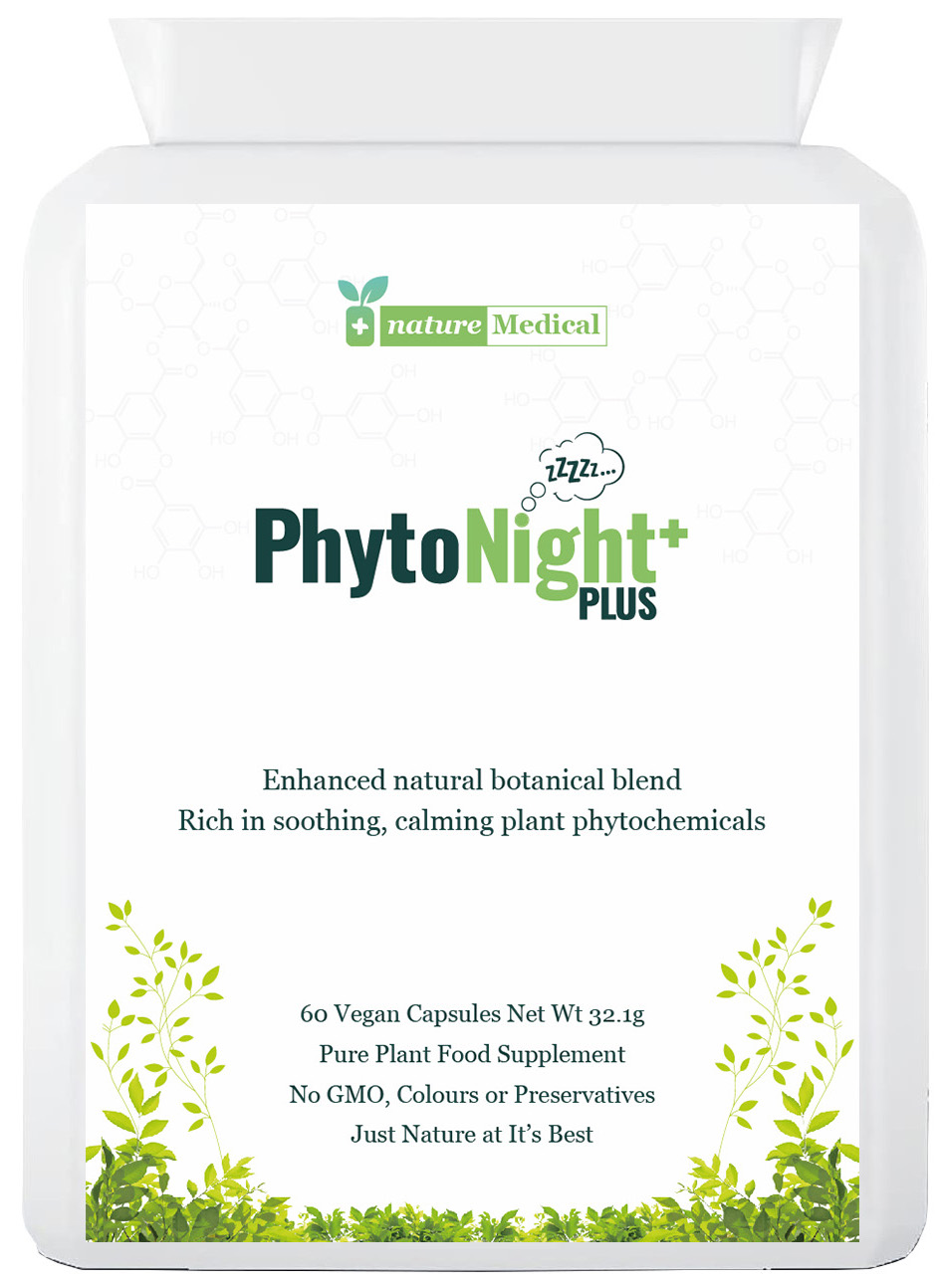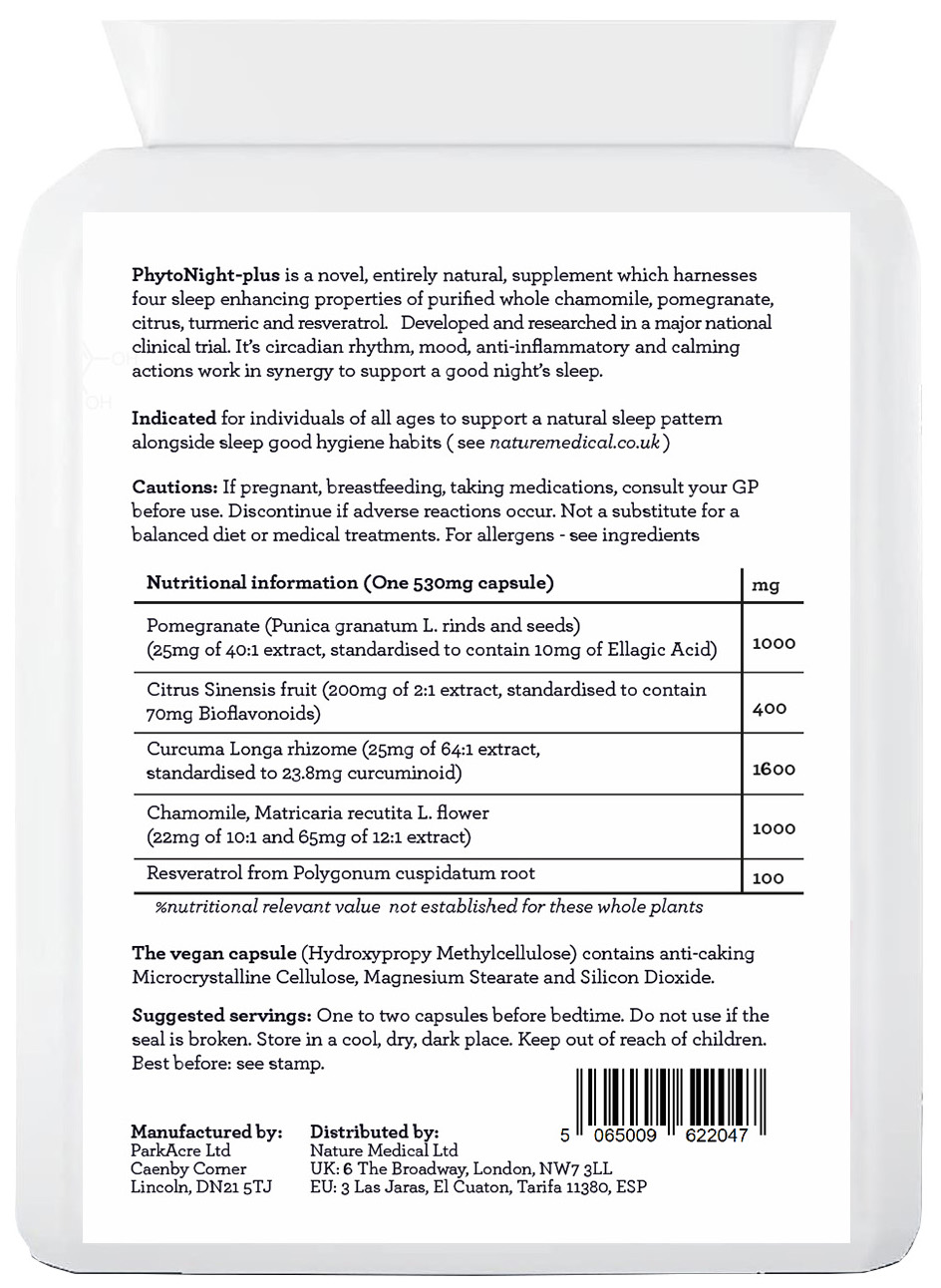About Phytonightplus+
PhytoNight-plus+ is a novel, entirely natural, nutritional supplement which harnesses the calming, mood enhancing and health properties of purified, concentrated whole plant foods1,2,3.
Developed by a scientific team from a Cambridge University Hospitals, this capsule does not just focus on sedation, like other herbal supplements, it prepares the body for a restful night by targeting 6 fundamental biological mechanisms which commonly interfere with sleep:
- Reducing stress levels – relaxing you before bedtime
- Elevating mood – reducing negative thoughts at night
- Boosting circadian rhythm – so your body knows when to sleep
- Supporting joint health – improving comfort at night
- Improving gut inflammation – reducing uncomfortable bloating
- Reduces day time fatigue – avoids need for day time naps
Targeting these multiple barriers to sleep, Phyto-nightplus+ aims to make you more comfortable, in a better frame of mind, more relaxed and biologically prepared for a restful night. It is not a quick fix, the natural phytochemicals in the ingredients aim to improve sleep for the long term as they are non-addictive, have no hang over effect or dependence, so safe to take continually4,5.
This blend evolved out of results of the UK’s largest nutritional intervention long covid study. It was designed by a scientific team led by Professor Thomas, a teacher at Cambridge University and professor of sports and nutritional science at Bedfordshire University.
The study, published in a prestigious peer reviewed international journal, showed a major reduction in day time fatigue – help by better sleep patterns at night. Since then it’s been used across the World with hundreds of reports of success.
The ingredients:
PhytoNight-plus contains 5 whole natural foods which work in synergy to promote their healthy effects. They have been purified and concentrated with scientific accuracy:

- Purified enhanced Chamomile flower (high strength)
- Whole ground Pomegranate
- Citrus Sinensis orange plant rich in citrus bioflavonoids
- Curcuma Longa extract and whole root
- Resveratrol from Polygonum Cuspidatum rhizome
Please note:
The ingredients of phytonight+ are very similar to Phyto-v (a supplement sold by The Keep-healthy group). So if you are already taking Phyto-V and having trouble sleeping, it would be sensible to take that in the evening and night. When that supply runs out you are welcome to take either – Both supplements support probiotics such as yourgutplus+.
Recommended use:
Most people, in the study, did not notice sedating properties in the day so can be taken to help with daytime stress. To help with sleep, however, it’s best to take 1-2 tablets before bedtime. The effects are usually not instant so you may not appreciate the full effect for several days. In addition to this nutritional intervention, it would be sensible, it would be wise to consider other sleep hygiene factors such as darkening the bedroom avoiding stimulants.
Quality Assurance:
 In order to meet the stringent standards from the UK national ethics committee for these clinical trial, PhytoNight-plus has to be made to a level of quality assurance unprecedented in the supplement world – so you can be reassured it’s safe and consistent. Novel features:
In order to meet the stringent standards from the UK national ethics committee for these clinical trial, PhytoNight-plus has to be made to a level of quality assurance unprecedented in the supplement world – so you can be reassured it’s safe and consistent. Novel features:
- Only purified and concentrated plant ingredients
- No added colours, preservatives or flavours
- No GMO ingredients
- Vegan capsule
- Each ingredient analysed for candidate phytochemicals – to ensure consistency
- Every batch tested for metal and pesticide contaminant – ensuring long term safety
.
Scientific background:
 Reducing stress and improving mood: Multiple studies have shown that the phytochemicals in these foods, particularly the resveratrol and chamomile work in synergy to mitigate stress and improve mood, helping to reduce negative thoughts. Boosting intake to levels well above that achieved from the foods or drinks helps to induce a state of calm and relaxed frame of mind rather than sedation, helping prepare for natural sleep 4,6,7,8.
Reducing stress and improving mood: Multiple studies have shown that the phytochemicals in these foods, particularly the resveratrol and chamomile work in synergy to mitigate stress and improve mood, helping to reduce negative thoughts. Boosting intake to levels well above that achieved from the foods or drinks helps to induce a state of calm and relaxed frame of mind rather than sedation, helping prepare for natural sleep 4,6,7,8.
Reducing physical discomfort: Symptoms at night such as joint pains, hot flushes, urinary frequency, abdominal bloating and wind caused by poor gut health all can cause restlessness and disrupt quality sleep.
Improving gut health: Fortunately, the anti-inflammatory, gut health enhancing properties of pomegranate, and turmeric are well reported clinical trials to help these symptoms particularly with longer term intake 9,10,11.
 Boosting circadian rhythm: The biological processes which relax the mind and dampen down the body’s metabolism in preparation for sleep (circadian rhythm) can be disorganised by poor gut health, international flights, staying up late at the weekend and lack of sleep itself – creating a vicious circle which gets worse over time. Disruption of the circadian rhythm not just effects sleep, it’s linked to many health issues ranging from dementia to heart disease 12. Fortunately, robust conducted trials have shown that the phytochemical in these foods, particularly the citrus bioflavonoids, resveratrol and quercetin in pomegranate help the bodies circadian rhythm get back on track 13-16.
Boosting circadian rhythm: The biological processes which relax the mind and dampen down the body’s metabolism in preparation for sleep (circadian rhythm) can be disorganised by poor gut health, international flights, staying up late at the weekend and lack of sleep itself – creating a vicious circle which gets worse over time. Disruption of the circadian rhythm not just effects sleep, it’s linked to many health issues ranging from dementia to heart disease 12. Fortunately, robust conducted trials have shown that the phytochemical in these foods, particularly the citrus bioflavonoids, resveratrol and quercetin in pomegranate help the bodies circadian rhythm get back on track 13-16.
For further information: The previous and ongoing clinical studies conducted buy this research group refer to the published papers below 18-23.
.
 References
References
- Amsterdam J, Li Y, Soeller I, Rockwell K, Mao J, Shults J. A randomized, double-blind, placebo-controlled trial of oral Matricaria recutita (chamomile) extract therapy for generalized anxiety disorder. Journal of clinical psychopharmacology. 2009;29(4):378.
- Amsterdam J, Shults J, Soeller I, Mao JJ, Rockwell K, Newberg AB. Chamomile (Matricaria recutita) may provide antidepressant activity in anxious, depressed humans: an exploratory study. Alternative therapies in health and medicine. 2012;18(5):44–9.
- Mao JJ, Li QS, Soeller I, Rockwell K, Xie SX, Amsterdam JD. Long-Term Chamomile Therapy of Generalized Anxiety Disorder: A Study Protocol for a Randomized, Double-Blind, Placebo- Controlled Trial. J Clin Trials. 2014 Nov;4(5):188. doi: 10.4172/2167-0870.1000188. Epub 2014 Oct 9. PMID: 29057164; PMCID: PMC5650245.
- Block KI, Gyllenhaal C, Mead MN. Safety and efficacy of herbal sedatives in cancer care. Integr Cancer Ther. 2004;3(2):128–148.
- Salamon I et al. Chamomile, a medicinal plant. Herb, Spice and Medicinal Plant Digest. 1992;10:1–4.
- de Oliveira MR, Chenet AL, Duarte AR, Scaini G, Quevedo J. Molecular Mechanisms Underlying the Anti-depressant Effects of Resveratrol: a Review. Mol Neurobiol. 2018 Jun;55(6):4543-4559. doi: 10.1007/s12035-017-0680-6. Epub 2017 Jul 10. PMID: 28695536.
- Yu Y, Wang J, Huang X. The anti-depressant effects of a novel PDE4 inhibitor derived from resveratrol. Pharm Biol. 2021 Dec;59(1):418-423. doi: 10.1080/13880209.2021.1907422. PMID: 33847209; PMCID: PMC8049461.
- Hieu T et al. Therapeutic efficacy and safety of chamomile for state anxiety, generalized anxiety disorder, insomnia, and sleep quality: A systematic review and meta-analysis of randomized trials and quasi-randomized trials. Phytother Res. 2019;33(6):1604-1615.
- Abdullahzadeh M, et al. Investigation effect of oral chamomilla on sleep quality in elderly people in Isfahan: A randomized control trial. J Educ Health Promot. 2017 5;6:53
- Thomas R, Yang D, Zollaman C. Phytochemicals in Cancer Management. 2017 Current Research in Compl and Alt therapy 105, 01.
- Thomas R, et al. Phytochemicals in cancer prevention and management. BJMP (2015) Volume 8 (2). 201-10
- National Heart, Blood, and Lung Institute. Sleep Deprivation and Deficiency. 2020.https://www.nhlbi.nih.gov/health-topics/sleep-deprivation-and-deficiency
- Xu T, Lu B. The effects of phytochemicals on circadian rhythm and related diseases. Crit Rev Food Sci Nutr. 2019;59(6):882-892. doi: 10.1080/10408398.2018.1493678. Epub 2018 Dec 22. PMID: 29999408.
- Huang JQ , Lu M , Ho CT . Health benefits of dietary chronobiotics: beyond resynchronizing internal clocks. Food Funct. 2021 Jul 21;12(14):6136-6156. doi: 10.1039/d1fo00661d. Epub 2021 May 31. PMID: 34057166.
- Zahra N et al. Association of the dietary phytochemical index with circadian rhythm and mental health in overweight and obese women: A cross-sectional study. Clinical Nutrition ESPEN 2022, 48 , 393-https://doi.org/10.1016/j.clnesp.2022.01.012
- Qiaoyu S et al. Strategies for circadian rhythm disturbances and related psychiatric disorders: a new cue based on plant polysaccharides and intestinal microbiota. Food & Function 2022, 13 (3) , 1048. https://doi.org/10.1039/D1FO02716F
- Thomas R et al. Lifestyle factors correlate with the risk of late pelvic symptoms after prostatic radiotherapy. Clinical Oncology (2013) 25 (4) 246-251.
- Thomas R, T Taylor, M Williams. A prospective survey of chapped lips and cold sores during chemotherapy. Focus on Cancer Medicine (2010); 2 (1) 3-7.
- Thomas R, M Williams, P Bellamy. A double blind, placebo controlled randomised trial (RCT) evaluating the effect of a polyphenol rich whole food supplement on PSA progression in men with prostate cancer – The UK National Cancer Research Network (NCRN) Pomi-T study. Prostate Cancer and Prostatic Diseases. (2014) 17,180-6
- Thomas R, Muhammad Shaikh, Michael Cauchi, and Dorothy Yang Prostate Cancer Progression Defined by MRI Correlates with Serum PSA in Men Undergoing Lifestyle and Nutritional Interventions for Low Risk Disease. J Lifestyle Dis Management. 2015 01 01
- Thomas R, Williams M, Cauchi M, Berkovitz S, Smith S. A double-blind, randomised trial of a polyphenolic-rich nail bed balm for chemotherapy-induced onycholysis: the UK Polybalm study. Breast Cancer Research and Treat 2018, 171,1 103
- Thomas R, Aldous J, Forsyth R, Chater A, Williams M (2021) The Influence of a blend of Probiotic Lactobacillus and Prebiotic Inulin on the Duration and Severity of Symptoms among Individuals with Covid-19. Infect Dis Diag Treat 5: 182.
- Thomas, R.; Williams, M.; Aldous, J.; Yanagisawa, Y.; Kumar, R.; Forsyth, R.; Chater, A. A Randomised, Double-Blind, Placebo-Controlled Trial Evaluating Concentrated Phytochemical-Rich Nutritional Capsule in Addition to a Probiotic Capsule on Clinical Outcomes among Individuals with COVID-19—The UK Phyto-V Study. COVID 2022, 2, 433.



